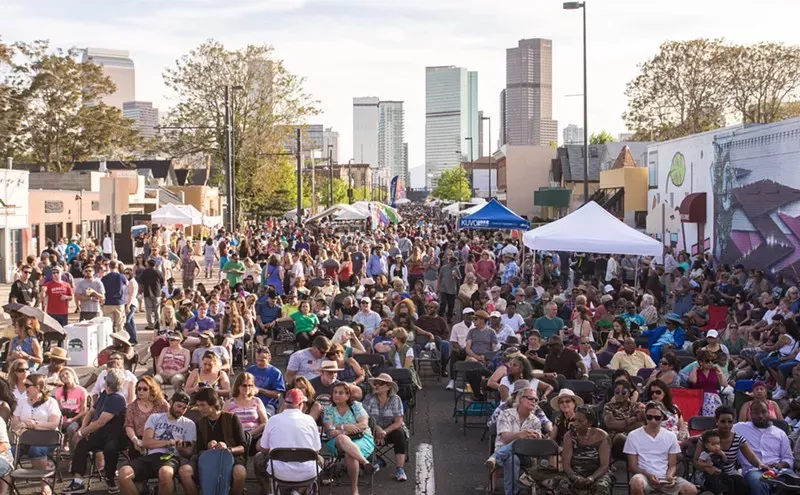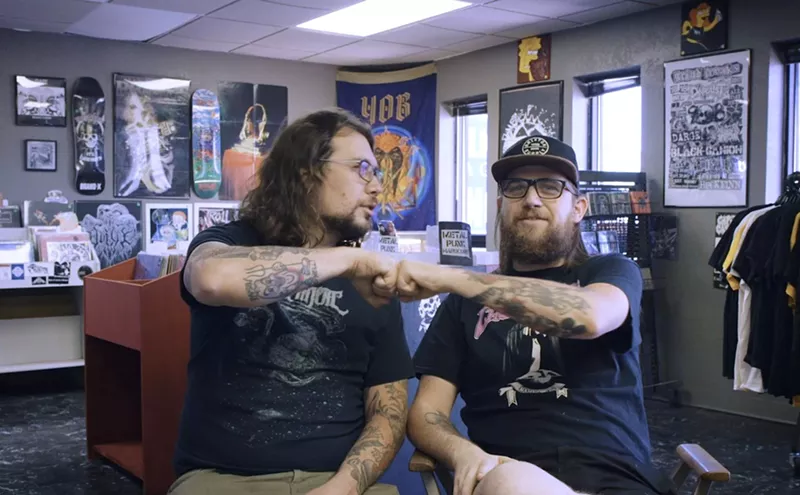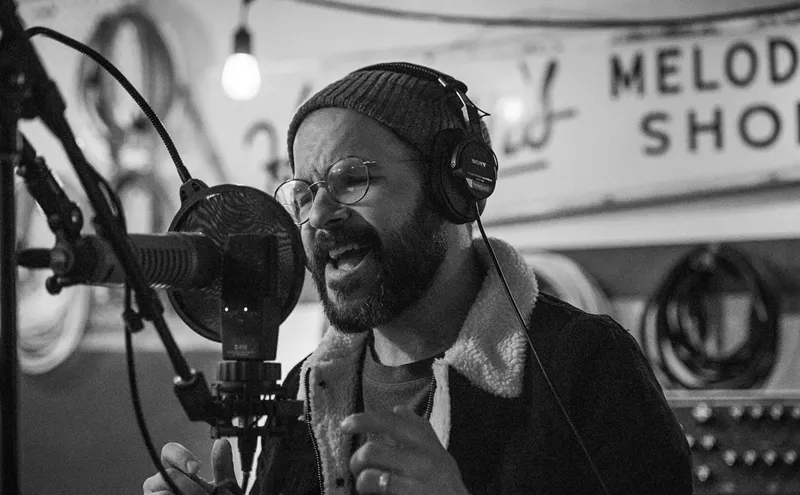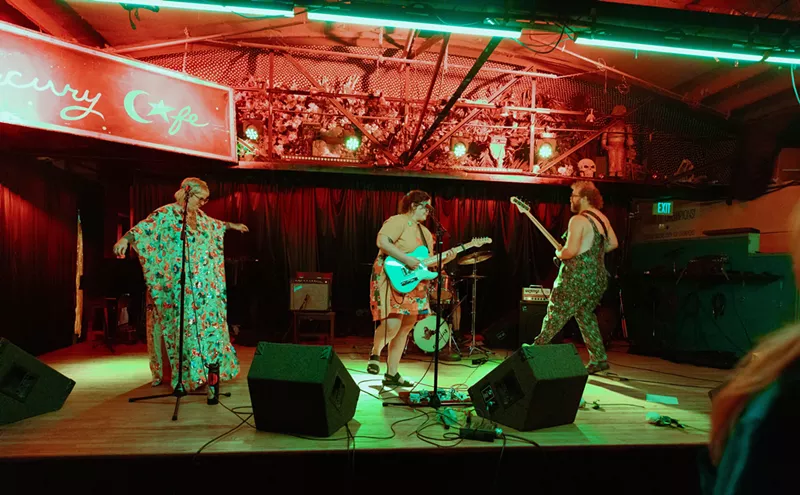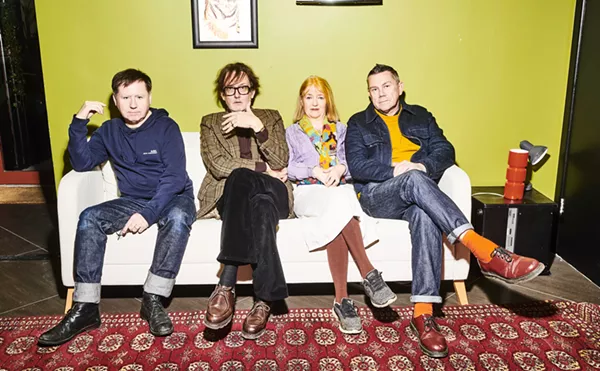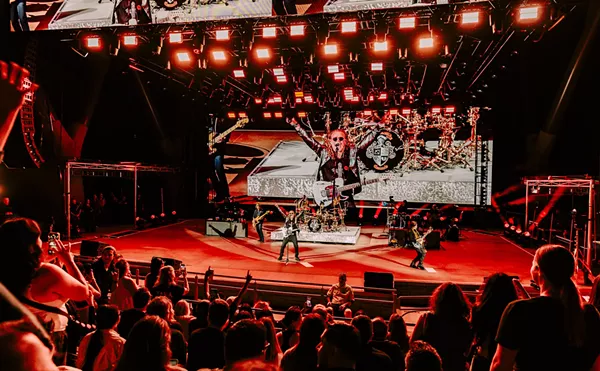Will Johnson (due this Saturday, November 23, at the Denver Music Summit) made a name for himself in the '90s in Centro-Matic. A gifted songwriter, Johnson has a knack for penning elegant, emotionally rich and subtly powerful, folk-inflected songs. Over the years, he's toured endlessly on his own and with other acts such as New Multitudes, Monsters of Folk and Undertow Orchestra with friends like Jim James of My Morning Jacket and Connor Oberst.
See also: The Denver Music Summit kicks off this Friday
Johnson's Denver appearance this weekend will include Johnson performing music as well as telling stories. We had a chance to speak with the thoughtful and eloquent Johnson about his early experiences playing in music, why the road is still a very important part of his life and why he is fascinated with painting lesser-known figures from the history of baseball.
Westword: You've been playing in bands since you were a teenager. What is your strongest memory of playing shows back then?
Will Johnson: Oh, goodness. I was in a band, I guess, in high school, called the Benjamins, and I think our first foray into playing in public was playing at the county carnival next to the hog pen and things like that. It was in this, as you might imagine, this big sort of exhibition, airplane hanger thing. It sounded horrible and looked worse. All our devoted and very kind high school buddies and all our pals came out.
I think we did a two night stand on a Friday and a Saturday. The money was huge for the time. I think we got two hundred fifty or three hundred dollars, which was astronomical. And I remember we finished up the shows, and talked about what we were going to do with all that money now that we were rich.
The bass player, maybe the singer, was of age and procured a twelve pack of cheap beer and went to Dennys or something like that. We sat around having late night supper, really glowing at the fact that we were using the money we made from the show to actually eat on and probably prematurely called ourselves professional musicians. That was my junior year of high school.
Aside from that, it was occasionally in these really rough biker bars in the military town we live in -- in Kileen, Texas, or that area. We weren't quite established, and couldn't get booked into Austin clubs, so we would play wherever they would let us. Our parents would come and support, look around and think, "Geez, our kids are deciding to do this with their lives? This is perhaps cause for alarm." It was funny watching my stepfather playing pool with all these bikers waiting for us to go on.
When you were in Funland you signed to Arista in 1992. In what ways did that influence how you handled your musical career later in life?
I got a little bit of an early education. I was a youngster when we signed to that label. I guess I was 20 or 21, and decided to take a break from college and go on the road and see what that was like. It definitely gave me an early taste of what the road was like -- these four and six week tours from time to time -- and how that would test your mind and your body.
We were signed in an era when major labels were signing just any band with two guitars, bass and drums and kind of long hair. It was clearly part of the post-Nirvana signing frenzy that went on with so many o the major labels. Many of those signings, of course, tax write-offs -- just throw something at a wall and see what sticks.
I suppose we were part of that approach. I'm not embittered about it, and I learned a lot about what not to do, and, in some cases, what to do. I'm really grateful for my friendship with my bandmates. We stay in touch from time to time, so it provided something last time.
But I smelled a rat when we turned in demos for our first full-length. We released an EP and the record deal was an EP with a full-length after that. We handed the demos over to the A&R guy, and we were exceptionally proud of them and happy with how the band was performing, and we were very locked in, in terms of friendships and how personal lives were going. We turned the demos over like a third grader might turn over an incredibly good report card. A week later, the A&R guy came back and told us, "You know, I was hoping for A and B songs, but these are B and C songs."
At that point, I thought we were clearly after different things.After that, we did something very unusual in asking out of the deal. We got in touch with our lawyer, and said we wanted to get out of our deal, and no longer wanted to have anything to do with them. Over the course of a few weeks, maybe a month or so, it was done. So we took the money and recorded the album we wanted to make and released it the following year on an independent label.
I think we were really happy about that. I think the sentiment on their side of things, they were like, "Oh, do you really want to jump ship?" And we were very certain. So for the misfortune that was at hand, it ended up being kind of rewarding in the end.
That's interesting because that's far better than having your album shelved, as happens with many bands in a similar situation.
Yeah, that would have been a lot worse. I would have taken a smaller label that would have given us more attention and shown our work more respect, rather than a major label that would have thrown a lot of money at it but not put their heart into it.
Not long after that, you went back to college at 24. What prompted that, and how did you feel about going back to college?
I was a little nervous, but I was excited to go back to college. I was going to Denton, Texas, which is where I started, in '89 and went through '92. Then I moved down to Dallas to do the Funland thing for a few years. So in '95, I went back there for a number of reasons. It had been heavy on my mind, and I had missed it a lot. On the work part of things, the job I was working at the time, they ended up cleaning house and laying a bunch of people off, so all arrows pointed toward making a move or changing things.
I was a little nervous about how things had changed since I left, but I was excited to be among a few old friends that were still there and in a music scene, that, at the time, was really full of life and great energy and a great sense of community. It still is now, but in a different way. It was just a really good era for music in that town, and I don't think it was any accident that at that time was when I wrote and eventually completed my first song with melody and lyrics and a bridge. I think I was just so inspired to be in that environment there.
That was the beginning of what became Centro-Matic. Midlake is from there, Baptist Generals, Slaughter Bums, Riverboat Gamblers started out there. It's a hotbed of various types of music, and I think it's a product of being an affordable state university within proximity of a major metropolitan area with a lot of venues and it has a great music school. You get so many musicians that go and decided to not study full time but instead play in a band.
You mentioned Centro-Matic, what made using a four-track studio an attractive option over a more traditional studio?
I was attracted to the creativity the that the limitations of a four-track really pushed. You only have a little bit of space to work with, and you have to maximize your performances and make something as good as you can in a very small space. I had borrowed the Funland four-track, and they let me take them from Dallas to Denton and back.
I had never really worked with one, and I started experimenting with it and finding that I just really loved the aesthetic of it. There's something about a Tascam 424 -- maybe it was a Mark II -- that I found so raw and personal, and I had a blast with it. Once I finished that first song, it was like the floodgates opened. I realized there was a whole world to work with in that little machine.
I was really into a lower fi aesthetic at that time. I started making recordings on a regular basis and releasing seven inches and cassettes and giving stuff away. In late '96 I made my first record and that was when I started doing more multi-tracking.
Did you do a lot of ping-ponging of tracks?
A little bit. But even that I didn't mess around with much until later.
Ah, yeah, people like John Vanderslice and Mark Eitzel made extensive use of that sort of thing.
I became friends with Mark in '01 or '02, and we became fast friends when we realized we were geographically-separated kindred spirits when it came to the four-track.
In terms of critical praise and commercial success, you seem very realistic about all of that stuff? Have you always been that way?
I don't know if know how to answer that. I'm grateful that anyone is listening at all, to be completely honest with you. I know it's common for musicians get frustrated when more people aren't listening to their output, but in the grand scheme of things, as distracted as we are as a people by so many forms of entertainment in this part of human history, given how we are so attached to screens -- a phone screen, a laptop or an iPod or video game; it seems we are constantly surrounded by and attached to screens like that -- I'm just grateful that anyone is listening in the first place.
I know that feels like a cop-out it is to say that, but part of doing these living room shows reaffirms for me how important it is to get together and do something or be in a room with people and create an energy or a moment that is memorable, because I guarantee that what we do when we leave that environment is to go home and check our emails or whatever and see what happened in the last few hours. I'm guilty of it myself, but one thing I really do like about touring in this way, and what I don't mind about the critical praise versus commercial success or whatever, is that anyone is paying attention in the first place. I'm very grateful for that.
You've been a prolific and hard working musician for years. What experience instilled that sort of work ethic in you?
I've been thinking about that on this drive. In the last several years, especially since becoming newly married and a father, on tour, I have taken a lot of comfort in accepting and realizing that I don't feel like I have to do this. I still really enjoy it. Ten or fifteen years ago, I don't think I thought I would enjoy it as much as I do at age 42. But still do really love the Zen, fairly nomadic nature of touring.
When I say "nomadic" I refer mainly to the solo and living room tours. There's something about it that is very spiritual and very comforting to me. There's clearly more technology and interstates involved, but it makes me think about what touring must have been like in the earliest times, when folks went from village to village just to entertain each other and to share ideas and to strengthen communication, I suppose. That's what keeps me coming back. If I get to a point where I don't want to do it, I won't do it.
Some folks have the perception that, "Well you guys have to get out and do this stuff." But really we get to get out and do this stuff. This is a really privileged and very fruitful and rewarding way to live. But we get to do it and we like to do it. I have bronchitis right now driving down the road and ingesting medicine, but that doesn't mean that in the grand scheme of things I'm not getting something really rewarding from it.
Every tour is different, and you learn something new from each one. You meet someone new that really strikes you. I think that's important, like we were talking about earlier, to get away from our technologies and screens and interacting with one another. My friend Jim [James], from Monsters of Folk and New Multitudes, and I were talking, and he said, "I can't wait for the day when all this shit just blows up in our faces and we're just people sitting around campfires trying to entertain each other again." We sort of had to laugh about that, but on the other hand, I think we need booster shots like that once in a while.
You were in a couple of bands, comprised of other fairly well-known musicians, like Monsters of Folk and Undertow Orchestra. What is it like touring in that sort of ensemble?
Each one is different but absolutely euphoric in its own way. Undertow Orchestra doesn't exist anymore but that was my first experience with that realm. It was a joy. We got together and quickly learned 32 or 36 songs and backing each other. We decided we would not do songs in the round or play separate sets or any of that stuff.
We were going to be a band and all be on stage the entire time, right notes, wrong notes, wrong beer cans, whatever. We were going to back each other for the entire show. So we were very dedicated to that from the start. I think that enriched our friendships, and I think that was a big part of the show. It wasn't just a pass the guitar kind of thing or song swap sort of stuff -- which bores the shit out of me, to be quite honest with you.
It's a similar thing with the Monsters. We got together with this foundation of respect for one another's music to where it's safe to say we wanted to serve the other's song. We wanted to be the best back-up singer, the best guitarist, the best drummer, the best bass player I could possibly be to serve Connor or Jim or the song as best could be. That's what we kept in mind with each of those projects.
But it's exhilarating because was a fan of all those guys for so many years, and friends with them for many years, but to get to peek into what they're approach is with learning music, performing it and preparing to perform music is a real treat. Just because you've known someone for years, doesn't mean you know how they prepare for putting a show on. It's a joy to get a peek into what makes everybody tick and what makes them excited about music. That's a wonderful thing to get to experience.
You worked on the Woody Guthrie Archive project. Do you have a favorite Woody Guthrie story?
I don't know that I have a favorite, necessarily. I finally got to meet Nora last year and that was a great honor. That was a very big deal. Overall, just the whole experience of seeing those archives and lyrics and sketches and realizing the fortitude and drive he had until the very end was very humbling and honoring thing to get to look upon. It was definitely one of the finest and most rewarding musical experiences I've ever been through.
You do paintings and many of them have baseball as their subject. What is it about baseball that you find interesting or inspirational?
A lot of it is based upon its unsung heroes. Some of the under the radar players. I think in a lot of ways the game and the evolution of the game sometimes reflects us as a country and as a people in very unique ways. There's a very pastoral yet, as Willie Mays put it, "violence under wraps" feeling to the game that I love.
I've always been infatuated with its pacing and its chess-like approach, ever since I was a kid. It came to the point, when I started painting stuff five or six years ago, and I had moved into a new place, and to be quite frank, I didn't have much stuff to hang on my walls, so I made some paintings to hang on my walls in my place to fill in the space. I grew to love it.
A lot like the songwriting thing, the floodgates just opened, and I started painting all these players that I loved and thought people should know about, and I started transmitting their stories into paintings. I started doing that on a regular basis, and when I felt proud enough to take them out of the house, I would have an art show or take them to a record store or alternate venues.
So that's been the case since 2009. I kept making them and there's a real therapy in painting to me. It's a completely separate thing from music. Although music is therapy, it's just a different type. It's quiet, and it's peaceful, and the hours can slide by, and I just don't realize it, so I'm grateful to get to do that.
Who are some of the players you paint?
A [couple of] examples of some of the lesser-known I wanted to talk about in the paintings is Moses Fleetwood Walker, and Eddie Gaedel, who played for the St. Louis Browns. He spent World War II as a riveter because he could get into tight spaces. He had an interesting life and a wild, short temper. But he has these jobs in circuses and side shows and as a riveter and worked hard and had an at bat for the St. Louis Browns. They were having trouble filling seats, so they came up with strange promotions. At any rate, I think a lot of people came out to laugh at the incident, but they were looking upon an interesting guy who had a colorful, wild life before and after his baseball endeavors.
Cool Papa Bell was one of my favorite Negro League players in history, and Satchell Paige and Buck O'Neil. There's another guy named Eddie Waitkiss, who had a woman who was infatuated with him. She showed up at his hotel and got in there after going to the front desk and telling the clerk she was an old friend of his from high school waiting to see him.
This was years after following him on the road. She went to his hotel room door after being granted permission and shot him with a rifle. She missed his heart by an inch or two. He survived it after several surgeries. He was able to keep playing baseball, but he was understandably troubled by the event. But that's yet another interesting story in baseball we don't often hear about. I just try to touch on strange corners and facets of baseball history that aren't always in the mainstream consciousness.
You were in the 2008 film Salt Creek County playing Clive Colby. How did you get connected with that film, and how was it like and completely unlike what you normally do?
It was my first foray into film. My friends Adam and Stuart Galassi and their good friend Tom Snyder wrote and directed the film, and had a character they felt I was the one to play, and they careful explained to me I had an imaginary friend in the movie with whom I'd be interacting and hanging out.
My lines were minimal, which I liked a lot. I didn't want a lot of space in the movie. It was fascinating to see how over the course of a week to a week and a half how a shoestring budget, independent film comes together and how the puzzle pieces are done. And getting a feel for how long the days can be. There are times when a twelve-hour studio session feels long, but a lot of times these days were sixteen and sometimes eighteen hours.
So it gave me a new appreciation for the general construction and teamwork and camaraderie that can develop in a crew and between actors and actresses. It was a smaller film, so we're not talking about some giant budget thing, but it enlightened to me to yet another creative endeavor.
There are times when you're waiting and waiting for the sun to come out from behind clouds or the weather to otherwise improve. I was advised beforehand to "Bring a good book because you're going to be waiting." In that regard, it's not unlike constructing a recording where people are waiting to play their parts.
So there are ways the two are alike, in the big picture, in that each tiny move that you make on the way to it eventually defines the big picture. Obviously, it's a group of people and it has to do with timing. So there are some similarities, no doubt about it. There are timelines and understandable stress.
On tour there's a lot of hurry up and wait.
Yes, touring is the perfect arena for hurry up and wait.
BACKBEAT'S GREATEST HITS - The fifty best rap lyrics of all time - The ten biggest concert buzzkills - Five more concert buzzkills - From Phish to Floyd, the ten best light shows
Follow @Westword_Music



